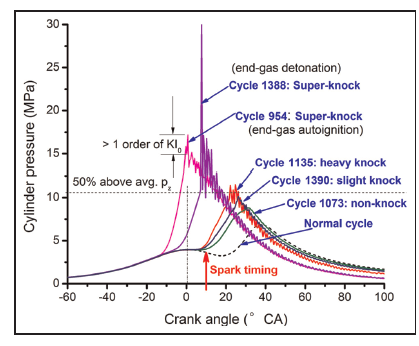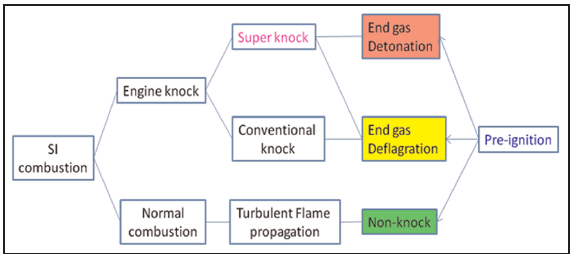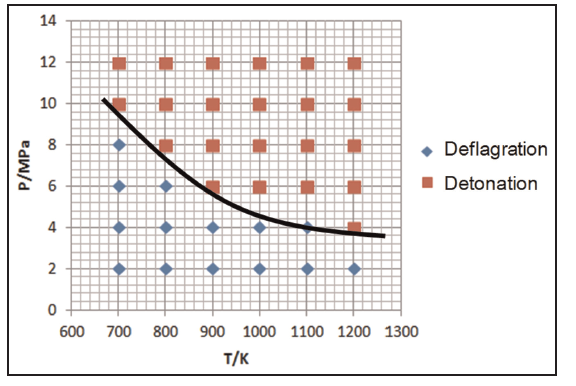Enki
Motorhead
This is more of a hybrid hardware and software/firmware sort of thread so I wasn't really sure where to put it, but I guess here is as good as any so fucking deal with it.
Hokay, so I've been mulling over this SAE whitepaper @rfinkle2 graciously allowed me to read yesterday and a couple things occurred to me; before I get into that, a bit about the whitepaper:
It's from 2014 and entitled "Investigation on Pre-ignition and Super-Knock in Highly Boosted Gasoline Direct Injection Engines" and has several pretty charts and lots of sciency bullshit 99% of the people that read this won't give a sloppy toss about. The gist is that there's a form of knock that's exclusive to DI engines that's pretty much an order of magnitude (10x) worse than regular knock; the kind of random, untraceable knock that causes a rod to Kool-Aid Man out the side of the block. The paper covers the test conditions (low rpm, moderate load, slighly under stoich AFRs) and finds that the so called "super knock" is very random (read: unpredictable) but provides cylinder pressure spikes that happen sooner and with significantly more force than "regular" knock.
So, back to my thoughts, and I'll keep this as short and sweet as possible for the sake of discussion:
1. This is probably what's going on with completely stock cars that like to get off the highway then shit a rod.
2. We know this sort of blowup doesn't happen with (properly) tuned cars or cars running corn mixes.
Point 2 leads me to think about the primary difference (that could be a factor in detonation, at any rate) between stock/OTS and a full tune, which is fueling. The stock tune is full on retard rich, which washes down the cylinder walls and likely coats everything in the cylinder with fuel; it's this excess fuel, I think, that is contributing to ye olde ZZB.
That said, why would a tune and/or corn mixes prevent this? Two reasons:
1. Less overall fuel sprayed compared to stock in tuned cars
2. Extra knock resistance from alcohols
Go go Gadget discussion.
Hokay, so I've been mulling over this SAE whitepaper @rfinkle2 graciously allowed me to read yesterday and a couple things occurred to me; before I get into that, a bit about the whitepaper:
It's from 2014 and entitled "Investigation on Pre-ignition and Super-Knock in Highly Boosted Gasoline Direct Injection Engines" and has several pretty charts and lots of sciency bullshit 99% of the people that read this won't give a sloppy toss about. The gist is that there's a form of knock that's exclusive to DI engines that's pretty much an order of magnitude (10x) worse than regular knock; the kind of random, untraceable knock that causes a rod to Kool-Aid Man out the side of the block. The paper covers the test conditions (low rpm, moderate load, slighly under stoich AFRs) and finds that the so called "super knock" is very random (read: unpredictable) but provides cylinder pressure spikes that happen sooner and with significantly more force than "regular" knock.
So, back to my thoughts, and I'll keep this as short and sweet as possible for the sake of discussion:
1. This is probably what's going on with completely stock cars that like to get off the highway then shit a rod.
2. We know this sort of blowup doesn't happen with (properly) tuned cars or cars running corn mixes.
Point 2 leads me to think about the primary difference (that could be a factor in detonation, at any rate) between stock/OTS and a full tune, which is fueling. The stock tune is full on retard rich, which washes down the cylinder walls and likely coats everything in the cylinder with fuel; it's this excess fuel, I think, that is contributing to ye olde ZZB.
That said, why would a tune and/or corn mixes prevent this? Two reasons:
1. Less overall fuel sprayed compared to stock in tuned cars
2. Extra knock resistance from alcohols
Go go Gadget discussion.




